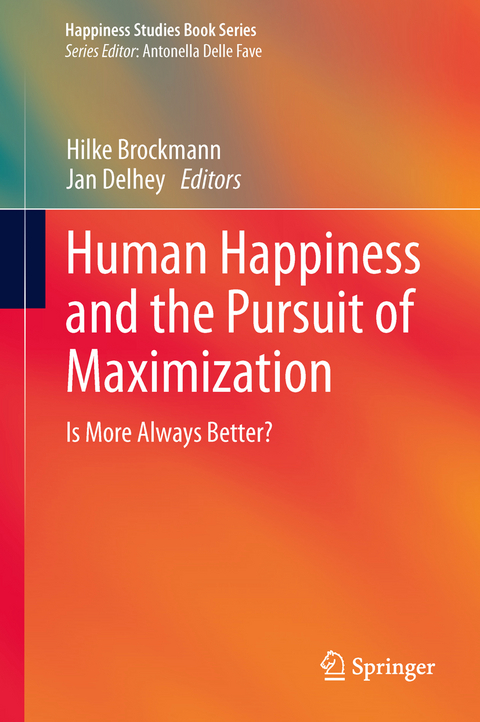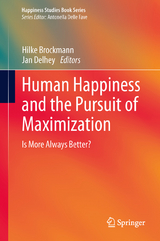Human Happiness and the Pursuit of Maximization
This book tests the critical potential of happiness research to evaluate contemporary high-performance societies. These societies, defined as affluent capitalist societies, emphasize competition and success both institutionally and culturally. Growing affluence improves life in many ways, for a large number of people. We lead longer, safer, and more comfortable lives than previous generations. But we also live faster, and are competition-toughened, like top athletes. As a result, we suspect limits and detect downsides of our high-speed lives. The ubiquitous maximization principle opens up a systematic gateway to the pleasures and pains of contemporary life. Using happiness as a reference point, this book explores the philosophical and empirical limits of the maximization rule. It considers the answer to questions such as: Precisely, why did the idea of (economic) maximization gain so much ground in our Western way of thinking? When, and in which life domains, does maximization work, when does it fail? When do qualities and when do quantities matter? Does maximization yield a different (un)happiness dividend in different species, cultures, and societies?
Hilke Brockmann is a Professor of Sociology at Jacobs University, Bremen and an experienced expert in population aging and well-being research. Her work deals with the individual and health related consequences of large-scale demographic, political and social changes. She has published in major international journals, is a member of the Editorial Board of Health Sociology Review, of several professional associations and an alumni of the Max Planck Society. She also counsels public health insurances, marketing boards, firms, and political parties. Jan Delhey, Professor of Sociology at Jacobs University, Bremen, is an internationally renowned expert in comparative quality of life research. He has published on living conditions, subjective well-being, trust, and social cohesion in leading European and international journals (his next piece of work on trust will appear in the American Sociological Review). He is a member of the Editorial Board of the Journal of Happiness Studiesand member of the board of directors of the International Society for Quality-of-Life Studies. For the European Foundation for the Improvement of Living and Working Conditions he has worked as an expert advisor for European-wide social reporting. Contributor to the World Book of Happiness; numerous radio and newspaper interviews.
Chapter 1. Is More Always Better? An Introduction; Hilke Brockmann and Jan Delhey.- Chapter 2. When the Pursuit of More Backfires - The American Experiment; Peter Whybrow.- Chapter 3. More Nonsense and Less Happiness: The Unintended Effects of Artificial Competitions; Mathias Binswanger.- Chapter 4. Happiness by Maximization?; Kurt Bayertz.- Chapter 5. Maximization and the Good; Valerie Tiberius.- Chapter 6. How Wise is Mother Nature? Maximization, Optimization and Short-Sighted Resource Use in Biological Evolution; Hanna Kokko.- Chapter 7. Towards a Neuroscience of Well-being – Implications of Insights from Pleasure Research; Kent C. Berridge and Morten L. Kringelbach.- Chapter 8. From Treating Mental Dysfunction to Neuroenhancement; Michael Koch.- Chapter 9. Do Aspirations and Adaptation Impede the Maximization of Happiness?; Ulrich Schimmack and Hyunji Kim.- Chapter 10. My Car is Bigger than Yours. Consumption, Status Competition, and Happiness in Times of Affluence; Hilke Brockmann and Song Yan.- Chapter 11. Some Lessons from Happiness Economics for Environmental Sustainability; Heinz Welsch.- Chapter 12. Public Policy and Human Happiness: The Welfare State and the Market as Agents of Well-Being; Robert Davidson, Alexander C. Pacek, and Benjamin Radcliff.- Chapter 13 Should the State Care for the Happiness of Its Citizens?; Aloys Prinz.- Chapter 14. A “Happiness Test” for the New Measures of National Well-Being: How Much Better than GDP are they?; Jan Delhey and Christian Kroll.
| Erscheint lt. Verlag | 23.7.2013 |
|---|---|
| Reihe/Serie | Happiness Studies Book Series |
| Zusatzinfo | VIII, 216 p. |
| Verlagsort | Dordrecht |
| Sprache | englisch |
| Maße | 155 x 235 mm |
| Themenwelt | Geisteswissenschaften ► Psychologie ► Allgemeine Psychologie |
| Geisteswissenschaften ► Psychologie ► Humanistische Psychotherapien | |
| Mathematik / Informatik ► Mathematik | |
| Studium ► Querschnittsbereiche ► Prävention / Gesundheitsförderung | |
| Naturwissenschaften ► Biologie ► Humanbiologie | |
| Naturwissenschaften ► Biologie ► Zoologie | |
| Sozialwissenschaften ► Soziologie ► Empirische Sozialforschung | |
| Wirtschaft ► Volkswirtschaftslehre ► Finanzwissenschaft | |
| Wirtschaft ► Volkswirtschaftslehre ► Makroökonomie | |
| Schlagworte | Consumptiom and Happiness • Downsides of modern societies • Economy and society • Glück • Happiness and Maximization • Happiness and Well-Being • Happiness in different societies and cultures • Konsumsoziologie • Maximization in Biological Evolution • Measures of National Well-Being • Mental health on high-speed lives • Neuroscience of Well-Being • Public Policy and Human Happiness • State Care for Happiness of Its Citizens • Treating Mental Dysfunction |
| ISBN-10 | 94-007-6608-4 / 9400766084 |
| ISBN-13 | 978-94-007-6608-2 / 9789400766082 |
| Zustand | Neuware |
| Haben Sie eine Frage zum Produkt? |
aus dem Bereich




